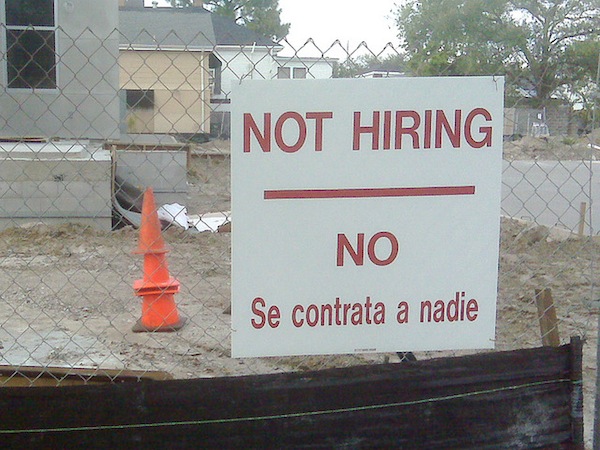
The Great Recession hit black workers the hardest, according to a recent report by The Urban Institute, a nonprofit, nonpartisan policy research organization.
“Many low-wage unemployed African-American workers are likely suffering more economic hardship than their white counterparts,” the report said, on top of the statistics that African-Americans likely have fewer assets to fall back on.
Although the unemployment rate is higher for blacks than for white or Hispanic workers, the report found that black workers were less likely to receive benefits than whites, 23.8 percent compared to 32.2 percent respectively. This is even after considering other factors that might explain differences like education, the type of job they held and length of employment.
Some of the difference could be attributed to workers’ choice or preferences, the report said, but it could also reflect discrimination in hiring and reported reasons for separation from those jobs, both of which can affect eligibility.
Previous similar studies have shown that unemployment benefits help to keep families out of poverty when a breadwinner loses a job, said Margaret Simms, one of the report’s authors. Having access to these benefits helps families reduce the need to deplete their assets and draw funds from retirement accounts.
The unemployment insurance system is designed to assist workers who lose their jobs through no fault of their own. A number of factors are considered that might be related to “fault,” Simms said. For example, “they were not fired for cause or quit the job voluntarily,” she said, or “they worked long enough in the job to show a commitment to the employer. They aren’t job ‘hoppers.'”
The measures used to determine fault may work against some types of workers seeking benefits. For example, people who leave a job for family reasons are not eligible in for unemployment in all states. People who don’t hold a job for at least a year are typically not eligible for benefits. In some states, people who are only looking for part-time work also may not eligible. Workers in certain industries might not get unemployment because their employers do not pay into the system.
California’s unemployment insurance system is fairly inclusive, allowing workers to leave a job and collect benefits for family reasons, and even if they are only looking for part-time work. Although there is currently no data specific to race and unemployment insurance benefits in California, the state saw fewer workers filing for benefits over the last year. The California Employment Development Department reported that there were 518,605 Californians receiving regular unemployment insurance benefits during July, compared to 566,380 last year. At the same time, new claims for unemployment insurance were 52,336 in July 2012, compared with 57,897 in July of last year.
But as the Urban Institute study reports, these numbers are not a true indicator of how many people are actually unemployed. There could be many more people who simply haven’t applied for benefits or have been denied for various reasons.
The current unemployment insurance benefit system is a combination federal-state system, with the states making up most of the rules on who is eligible and setting the tax rates for employers who contribute to the system.
Simms says eliminating the racial gap in benefit receipt work require greater information dissemination about who qualifies, as well as some changes in state and federal policy.
“The federal government could make it attractive for states to institute reforms that make the program more inclusive,” Simms said. This tactic was tested under the 2009 Unemployment Insurance Modernization Act, which was part of the stimulus package, and was only partially successful in encouraging reforms.
“The federal government could also assume a greater share of the costs on an on-going basis, basically federalizing the system,” Simms said. That might not be very likely, she added, given the current concerns about the federal budget deficit.





